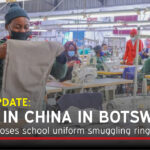Regularly referred to as ‘Botswana’s food basket’, Pandamatenga Farms are embarking on an ambitious new project to produce cooking oil from sunflowers.
When fully operational, the processing plant will have a capacity for 1 million litres of oil a year, although initially farmers are targeting half that.
Giving Voice Money a brief overview of the initiative, Production Manager, Dewald Els revealed they started building the machines for the plant in May and expect processing to be up-and-running by January.
“We as Botswana are importing most if not all sunflower oil. The demand is extremely high. If we look at edible oil in Botswana, the average consumer consumed 7.31l in 2022; that means the country needs 14million liters of edible oil every year,” he explained.
With current prices still painfully high, and a 2-litre bottle of cooking oil likely to set one back around P65, Els added, “We will try to compete or at least drop prices of the very expensive oil that is being imported into Botswana.”
The project setup comprises of storage space for sunflower seeds and a processing plant, including two oil pressers as well as further storage tanks.
According to Els, cold-pressed sunflower oil is extracted from organic sunflower seeds and is unrefined, thus full of health-boosting nutrients.
“It is a healthier alternative to preheating the sunflowers and squeezing all the oil you can get,” he states.
“What we are basically trying to do is supply a market of about 500 to 1, 000 metric tons of sunflower that will be converted into oil per year,” he continued, describing Pandamatenga as a special economic zone.
“We are fortunate enough to have local farmers who produce sunflowers so we will be able to secure sunflowers in bulk,” he added.
Els is adamant the sunflower oil sector has great potential to improve livelihoods and the welfare of people, noting the project has created job opportunities.
“The project will provide a market for local sunflower farmers and encourage other farmers to produce sunflowers,” he said, adding the plan is to convert whatever remains of the sunflower after pressing into livestock feed.
“Sunflower seed cake is a rich source of protein,” Els highlighted.
The project will collaborate with local farmers to assist with sourcing bean splits and sorghum leftovers in order to formulate pallets and healthy supplements for livestock.
















